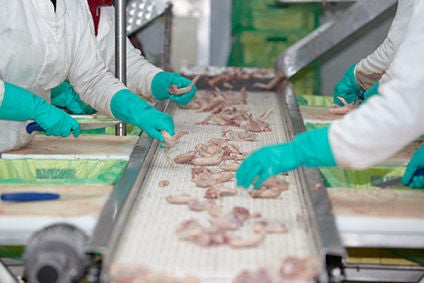
A host of organisations representing UK manufacturers are urging the Government to introduce new visa rules to address the labour and HGV driver crisis contributing to food shortages.
The Food and Drink Federation and The British Meat Processors Association (BMPA) are among the 12 signatures, which also include the Road Haulage Association, to a report put together by accountancy firm Grant Thornton.

Discover B2B Marketing That Performs
Combine business intelligence and editorial excellence to reach engaged professionals across 36 leading media platforms.
Top of the list of their requests is for the introduction of a so-called 12-month Covid-19 recovery visa. The scheme would allow the recruitment of European workers in areas such as food and drink manufacturing and haulage drivers as a short-term measure to address the shortage of qualified staff as a result of Brexit. The pandemic has worsened the situation with some employees either off sick or having to isolate.
“This visa will alleviate the pressure on the sector and give it the time it needs to continue to recruit and train domestic staff,” the Grant Thornton report notes. “Alongside this, the UK Government should commission the Migration Advisory Committee (MAC) to undertake a detailed review of the sector – as it has done for the social-care sector – and identify areas of shortage where short-term immigration solutions can be implemented and/or what roles should be added to [the] Shortage Occupation List.”
Warnings have increased in recent weeks over food shortages as the industry prepares for the run-up to Christmas. The BMPA, which represents UK meat companies, has expressed concern about a shortage of pork for the Christmas festive season, echoing a similar warning by The British Poultry Council over the availability of turkeys.
Steve Murrells, the CEO of UK food retailer The Co-op, said this week “the [food] shortages are at a worse level than at any time I have seen,” adding the grocer is reducing some ranges due to manufacturers’ diminishing ability to get products to stores as the HGV shortage bites.

US Tariffs are shifting - will you react or anticipate?
Don’t let policy changes catch you off guard. Stay proactive with real-time data and expert analysis.
By GlobalDataMeanwhile, The British Retail Consortium estimates there is a shortage of 90,000 heavy goods vehicle drivers, a situation made worse by a backlog of people in the UK waiting to take their tests as a result of the pandemic, while the training of haulage drivers remains a lengthy process.
Nick Allen, the CEO of the BMPA, said in backing for the report: “Since Brexit, the Government has put in place new immigration rules that have abruptly pulled up the drawbridge and shut off access to overseas workers with specific skills and experience. This has plunged the meat industry and many others into a full-blown labour crisis.”
Grant Thornton said that of the 73 food and drink businesses it surveyed, there was an average vacancy rate of 13%. It found there are 953,000 open positions across all UK sectors, with more than half of them in the food and drink sector, which contributes GBP120bn (US$165.1bn) to the economy and employs in excess of 4.1 million people.
An ageing workforce could also contribute to the labour shortages in the longer term, Grant Thornton said, estimating around one million people in the sector are due to retire within the next ten years.



